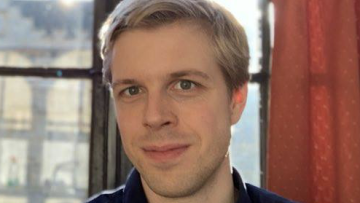Swampland conjectures and infinite flop chains
Brodie, C
Constantin, A
Lukas, A
Ruehle, F
Physical Review D
volume 104
issue 4
(04 Aug 2021)
Symmetry and simplicity spontaneously emerge from the algorithmic nature of evolution
Johnston, I
Dingle, K
Greenbury, S
Camargo, C
Doye, J
Ahnert, S
Louis, A
Proceedings of the National Academy of Sciences of the United States of America
volume 119
issue 11
(11 Mar 2022)
Measurement cost of metric-aware variational quantum algorithms
van Straaten, B
Koczor, B
PRX Quantum
volume 2
issue 3
(10 Aug 2021)
Oxford Mathematician Lukas Brantner explains how generalised Lie algebras lead to new insights in Galois theory, deformation theory, and the theory of configuration spaces. Lukas has just been awarded a Royal Society University Research Fellowship.
Topological formulae for the zeroth cohomology of line bundles on del Pezzo and Hirzebruch surfaces
Brodie, C
Constantin, A
Deen, R
Lukas, A
Complex Manifolds
volume 8
issue 1
223-229
(16 Jul 2021)
Optimal closed-loop deep brain stimulation using multiple independently controlled contacts
Weerasinghe, G
Duchet, B
Bick, C
Bogacz, R
PLoS Computational Biology
volume 17
issue 8
(06 Aug 2021)
“Hey, that's not an ODE”: Faster ODE Adjoints via Seminorms
Kidger, P
Chen, R
Lyons, T
Proceedings of Machine Learning Research
volume 139
5443-5452
(01 Jan 2021)
Neural SDEs as Infinite-Dimensional GANs
Kidger, P
Foster, J
Li, X
Oberhauser, H
Lyons, T
Proceedings of Machine Learning Research
volume 139
5453-5463
(01 Jan 2021)



